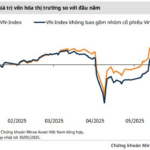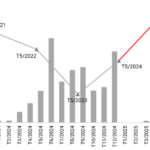According to the Vietnam Investment and Ratings JSC (VIS), in the last six months of 2025, 474 bonds with a total debt of up to VND 150 trillion will mature. Of these, 148 bonds with a total debt of VND 25.8 trillion have been delayed in payment, with the real estate sector accounting for half of the total maturity value.
Notably, VIS assessed that 26 bonds with a total debt of VND 19 trillion, issued by 15 real estate companies, are at risk of first-time payment delays as many real estate businesses continue to face challenges with cash flow, collateral, and financial credibility.
Meanwhile, the primary market has witnessed a distinct growth momentum. In May 2025 alone, the total value of newly issued bonds reached VND 66 trillion, a 35% increase compared to April, all of which were private placements. For the first five months of 2025, the total new issuance reached VND 137 trillion, up 79% over the same period last year.
The growth momentum was mainly driven by commercial banks, with an issuance value of up to VND 100 trillion, a surge of 193% year-on-year. Non-convertible bonds accounted for 63% of the total new issuance value of banks, with tenors ranging from two to three years and fixed coupon rates ranging from 5.1% to 6.0% per annum.
VIS believes that, in the context of loan growth being much higher than deposit growth, banks will continue to promote long-term bond issuance to ensure capital sources and maintain capital adequacy ratios, expected to lead the issuance market in the second half with a total planned issuance of nearly VND 200 trillion.

Credit risk remains, especially in the real estate sector.
Among these, Military Commercial Joint Stock Bank (MB) plans to issue VND 30 trillion worth of bonds in 2025, while Asia Commercial Joint Stock Bank (ACB) expects to issue VND 20 trillion.
Apart from banks, Nam Long Investment Joint Stock Company (NLG) has also approved a plan to issue secured, non-convertible, and non-attached warrant bonds with a total value of up to VND 660 billion, with a three-year term and a fixed interest rate of 11%/year for the first two periods.
Despite the recovery in the primary market, credit risk remains, especially in the real estate sector. In May 2025, four bonds were delayed in payment for the first time from companies with weak credit profiles, high financial leverage, and a history of previous bond payment delays.

Under new regulations, issuers of private placement bonds must meet a condition where their total liabilities do not exceed five times their owner’s equity (illustrative image)
A report by the Vietnam Bond Market Association (VBMA) also showed that, in the last seven months of 2025, about VND 149,870 billion worth of bonds will mature, with the real estate sector accounting for 53%, equivalent to VND 79,769 billion.
It is known that the National Assembly recently passed the Law Amending and Supplementing a Number of Articles of the Law on Enterprises, stipulating that enterprises issuing private placement bonds must meet a condition where their total liabilities (including the value of the bonds to be issued) do not exceed five times their owner’s equity.
The law’s regulation on the debt-to-equity ratio is one of the conditions for private placement bond issuance by non-public companies, aiming to enhance the financial capacity of issuing companies and limit bond payment risks for both issuers and investors.
The Government Official’s Entrepreneurial Endeavors: Navigating Restrictions with Precision.
The amended Enterprise Law outlines specific restrictions on individuals who are not permitted to establish, contribute capital to, or manage enterprises. This includes public employees and officials as outlined in the Law on Public Employees and the Law on Officials, with the exception of those involved in activities related to national science, technology, innovation, and digital transformation initiatives.
“Amended Enterprise Law: Tightening the Reins on Private Bond Issuance by Enterprises”
On the morning of June 17, with an overwhelming majority of 95% of the delegates present, the National Assembly passed the Law amending and supplementing a number of articles of the Law on Enterprises. The most notable aspect of this legislation is the provision pertaining to the conditions for private bond issuance by enterprises.
May 2025 Private Placement Memorandum: Issuance Scale Hits 5-Year High, with Many Businesses Defaulting.
The private corporate bond market witnessed a remarkable growth spurt in May 2025, with a total mobilized value of over VND 68.5 trillion – the highest in the same period since 2021.











































